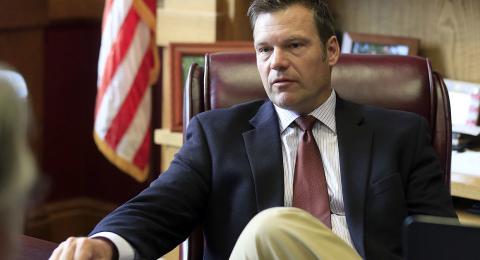Ballots submitted by unaffiliated voters in the Republican primary for Kansas governor may not be counted, according to Assistant Secretary of State Eric Rucker.
Kansas Secretary of State Kris Kobach currently has a tight 110-vote lead over Governor Jeff Colyer. But the 9,000 uncounted provisional ballots spread throughout 105 counties have not yet been tallied. These make up the votes who may or may not meet the requirements to be considered valid - such as a lack of party affiliation.
The Law Vs. Intent
The state has semi-closed primaries whereby unaffiliated voters must declare a party at the polls, and then vote in that party’s primary if they want to participate. So they may walk in as an independent but must walk away as a party member.
In an email, Rucker cites Kansas election law, “if an unaffiliated voter does not complete a party affiliation document, that voter is not entitled to vote at a party primary election.”
Gov. Colyer’s legal team pushed back on the claim, The Kansas City Star reports:
“Kansas law requires canvassers to look to the intent of the voter” in cases where a poll worker incorrectly tells an unaffiliated voter to cast a provisional ballot, rather than to affiliate and then vote," said in the letter to the Kansas Morning Star on Monday. “Kansas law requires that provisional ballots cast by unaffiliated voters in a primary election be construed as evidence of voter intent and must be counted."
This is just one more feature of the contentious race as the two Republican candidates go head-to-head. Just last week, bowing to public pressure, Kobach tapped Rucker to oversee the race during the campaign.
The counting of provisional and mail-in ballots will now stretch over the next week as the 9,000 provisional ballots are verified or cast aside if they don't meet verification requirements. The deadline is August 20.
A Few Quick Facts:
- As secretary of state, Kobach appointed top election officials in Johnson and Sedgewick counties, where more than 40 percent of the ballots originate.
- The secretary of state's office provides guidance. However, the counties handle the ballots and counting.
- In Kansas, there is an appointed election commissioner in each of the state's four most populated counties — Johnson, Sedgwick, Shawnee and Wyandotte — and the chief elections officers in the other 101 are elected clerks.
- The chief elections officer appoints a bipartisan board that handles the ballots.
- Those workers decide whether the provisional ballots will be counted. The elections chiefs take the recommendations to the county commission to make the final decision.
